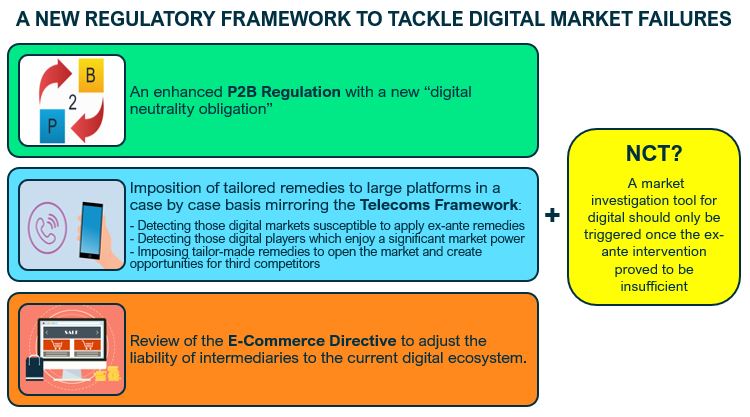 Enrique Medina
Enrique Medina
Ex ante rules for large platforms and the New Competition Tool: two instruments to tackle market failures over digital?
A couple of weeks ago, Spotify and other European platforms announced the creation of a coalition calling for App fairness in the Apple Store. They complain particularly about Apple’s payment rules which oblige App developers to pay Apple 30% of the fee paid by the customer for the use or purchase of the service done through Apple Store (the so-called “30% tax”). Moreover, the coalition proposes a range of App principles that would ensure “neutrality” within the App Store. The main objective is to guarantee that Apple does not leverage its ownership of the App Store to prioritise its services over its business users when competing in the same market, and ties the use of payments and other ancillary services to the App Store, as well as not imposing unfair terms and conditions for business users.
It is pleasing to see these views and proposals being put forward by “The Coalition for App Fairness”. Telefonica has been advocating this approach since our thought leading Digital Manifesto (2014) and which was expanded upon in its sequel in 2018.
In our first “Manifesto for a safe an open Internet” we called for the opening up of application stores, mobile operating systems and platforms to protect the Open Internet, specifically referring to the 30% payment tax in app stores. We warned about a shift toward a Feudal Internet, where everything was under control of a few platforms, proposing the portability of apps and interoperability to open up the ecosystem.
Our second Manifesto (2018) underlined the need of a “human centric digitalization”. It discussed the Internet of Platforms, with these new digital gatekeepers acting as bottlenecks controlling digital experiences of people; whilst pointing to AI, algorithms and virtual assistants as the next lever to expand such gatekeeping role. Over six years have passed since speaking out about our concerns, calling policymakers and regulators to modernise policy frameworks. It seems the time has finally come, with strong momentum from policy makers and industry participants to regulate digital players.

The idea to regulate the Digital Economy in order to tackle these anticompetitive conducts and ensure that digital markets remain open and contestable is not new, but it has been gaining momentum in the last few years. The digitalization process, that the pandemic has evidenced to be an urgent necessity, is gradually being taken up by traditional sectors which are at the same time struggling to compete with the newly entrenched big large platforms.
For some, the level of control over the app ecosystem was evident in the way governments were restricted in what they could do with contact tracing during the pandemic by the “moral philosophy” of private companies that control the platforms and the constant threat of hampering innovation.
It is indeed undeniable that the market power enjoyed by these few large platforms was fairly gained by launching in a bunch of innovative and high-quality services. However, as time has passed, the particularities of the digital sector (i.e. strong direct and indirect network effects, economies of scale and scope, conglomerate effects etc.), have resulted in minimum opportunities for new entrants to compete on the merits. Indeed, this strong market power has been used by these platforms to leverage their position in the markets in which they are already active as well as to expand it to neighbouring markets, creating closed ecosystems across the Internet value chain.
Aware of the current market failures exerted by these few dominant platforms, the European Commission (EC) launched last June a parallel public consultation related to the Digital Services Act (DSA) proposal on ex-ante rules for large platforms acting as gatekeepers, and the New Competition tool (NCT), managed by DG CNECT and DG COMP respectively.
According to the EC, both tools are aimed at being complementary, but the scope and the goals are not clearly delineated while there is an evident overlap between them. The DSA is meant to set out a sector-specific regulation to ensure digital markets remain open and competitive, but the scope of the NCT is not clear at all: the proposal could establish either an “ex-ante intervention” of DG COMP to tackle structural competition problems in all sectors (including digital), or focus only on digital markets but extending the umbrella to catch traditional sectors that are involved in the process of digitalisation.
Telefónica responded to the public consultation supporting the DSA proposal to establish an ex-ante regulatory framework for the digital sector; imposing tailor-made remedies on case-by-case basis to those platforms that enjoy a dominant position and impede effective competition in a given market. In doing so, we strongly believe that the Telecoms Regulatory Framework is a good precedent that could form the structure and inspiration for an ex-ante framework for digital markets. The DSA proposal should not point out specific platforms but detect those digital markets in which there is a lack of competition and then identify the dominant player in the targeted market to impose tailored remedies aimed at ensuring that digital markets are contestable and open for new entrants.

These ex-ante rules for large platforms should be complemented, under the DSA proposal, by a horizontal “digital neutrality” obligation, a set of end user rights at the platform level equivalent to those created under the Open Internet Regulation that are limited to network neutrality. Otherwise, in the long run, the protections afforded to users at the network layer, will be undone by the market power of digital platforms that are now the main way content is distributed and viewed. Lastly, we believe that the enforcement of the DSA proposal on ex-ante rules should be dealt by network of European and national regulators, with the EC being at the heart of the regulatory authorities network.
When it comes to the NCT, we strongly believe that there is no need for this ex-ante intervention of DG COMP to tackle structural competition problems that are sufficiently tackled by sector- specific regulation. This happens not only in traditional sectors, but also over digital as the DSA proposal is meant to do so. In our response to the public consultation, we also highlight that if there is a problem with antitrust tools being insufficient to address problematic digital platform markets, then the first approach must be to fix antitrust, rather than create a new layer of market supervision. Indeed, we believe that the ongoing review of the competition toolbox should be adapted to give response to the challenges emerged by the Digital Economy, also to capture problematic digital platform markets.
Notwithstanding this, if both tools are supposed to coexist, even tackling same issues over digital, clear borderlines should be established in order not to create further legislative burdens for already economically regulated sectors. Checks and balances are very much needed, in particular in relation to the selection of markets for review and the separation of the investigation function from the executive body (mirroring the Market Investigation tool of the UK National Competition Authority).
We expect that at the end of the year we should see published both legislative proposals that will be subject to the co-decision procedure, before passing into law. In the meantime, and as we have been doing for more than six years, Telefónica will continue pushing for a Level Playing Field across the Internet value chain, aimed at ensuring all agents play with the same rules when competing for the same customers.






